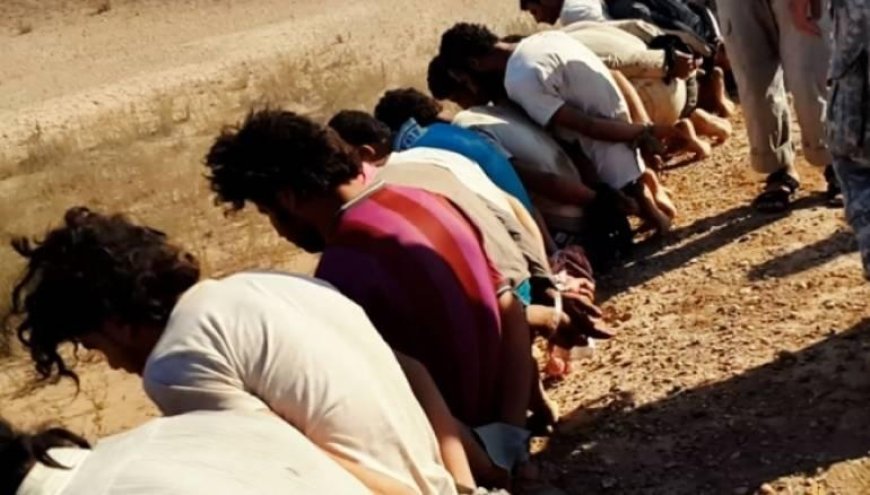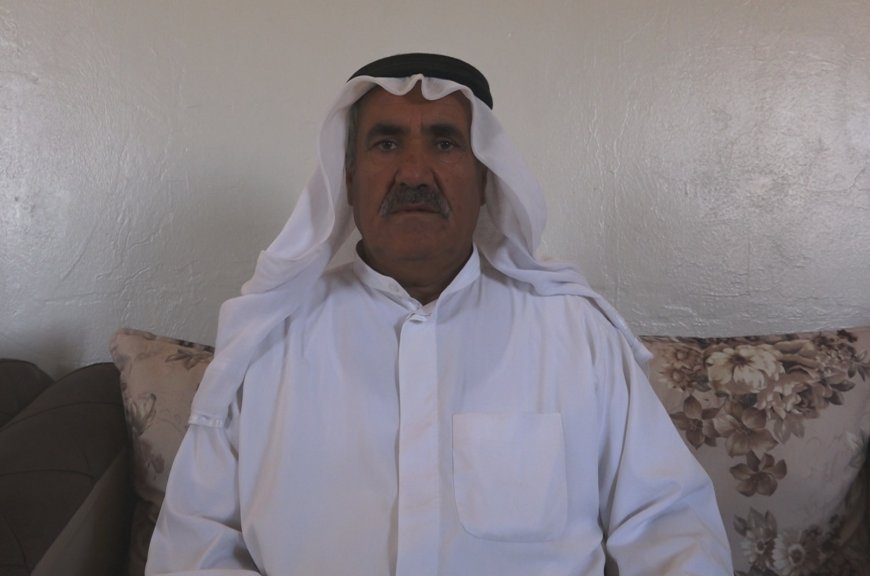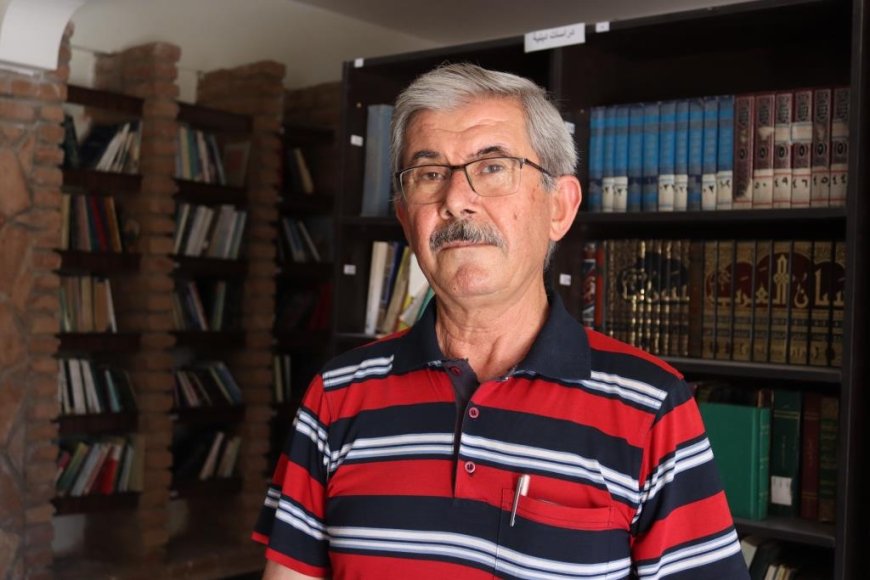On 10th al-Shaitat massacre, calls for solidarity against extremism
On the tenth anniversary of the al-Shaitat massacre, segments of society called for rallying around the Syrian Democratic Forces and the Democratic Autonomous Administration, considering it the only way to close the record of ISIS/Daesh mercenaries. They stressed the need to raise awareness among the people of the region and not be dragged behind extremist agendas.

In August 2014, the Arab al-Shaitat tribe was subjected to the most heinous massacre known to Arab tribes in Syria, carried out by ISIS mercenaries in the eastern countryside of Deir ez-Zor, after the tribe refused to submit to their authority.
After ISIS mercenaries took control of the city of Mosul in June 2014, and declared the so-called (Islamic Caliphate) on June 29, 2014, from the Great Mosque of al-Nuri in Mosul, ISIS increased its attacks to expand into Syria, and during their attempt to enter Deir ez-Zor, the sons of the Arab al-Shaitat tribe resisted ISIS.
The Al-Shaitat tribe is one of the tribes of the al-Aqeidat tribe spread on the northern bank of the Euphrates River in the eastern countryside of Deir ez-Zor canton, and its number reaches more than one hundred thousand, according to statistics from 2010. It is also one of the first tribes to take its place in the ranks of the peaceful movement in Syria in 2011, demanding the overthrow of the "Syrian regime", due to its marginalization of their areas.
In July 2014, ISIS mercenaries took control of the al-Shuhail area in Deir ez-Zor, and forcibly displaced the people of al-Shuhail over a period of two weeks. After that, the fighting in the area escalated, as ISIS mercenaries began a campaign of revenge against the al-Shaitat tribe, which refused to submit to their authority. A fatwa was issued by the so-called Abu Abdullah Al-Kuwaiti, stating that the people of al-Shaitat belong to “a group that refuses to submit to Islamic rule with weapons. It is not permissible to conclude a truce with them or release their prisoners, neither with money nor by any other means. It is not permissible to eat the meat of the animals they slaughter, and no one is allowed to marry their women. It is permissible to kill their prisoners and to pursue and kill anyone who escapes from them. It is also permissible to kill those who are injured among them, and they must be fought even if they did not start the fighting.”
After the fatwa, ISIS mercenaries arrested more than 50 workers from the towns of al-Shaitat, who were working in the al-Tanak oil field in eastern Deir-ez-Zor, and executed them in cold blood.
Starting in the week of August, ISIS mercenaries declared the town of Abu Hamam a military zone, closed the roads, and began shelling them. After 5 days, ISIS mercenaries took control of the town in addition to controlling the towns of al-Kashkiya and Gharanij, and thousands of civilians fled those areas in fear of the brutality of ISIS mercenaries.
The massacre took place in the villages and towns of the "al-Shaitat" clan and extended to several neighboring areas, starting from the northern and northeastern outskirts of Deir-ez-Zor canton, where the mercenaries targeted the villages and towns of "Abu Hamam, al-Kashkiya, Gharanij, and Abu Hardoub, reaching the town of al-Bahra", where the mercenaries closed the roads, blew up homes, and kidnapped many al-Shaitat men as hostages.
Reports showed that the number of dead reached 1,700, including men, women, and children, and more than 1,000 others were kidnapped, where they were executed massively, and the mercenaries used horrific methods to terrorize the population, and the victims were buried in mass graves, the mercenaries prevented any kind of condolence or memorial service.
Following these crimes, many members of the al-Shaitat tribe fled to safer areas, such as the areas of North and East Syria, in addition to their asylum in Iraq as well, which led to the destruction of the social and cultural fabric of the tribe. This massacre weakened the tribe's ability to resist, which allowed ISIS to strengthen its presence in the region for a long time.

The notable of the al-Shaitat tribe, Abdul Rahman al-Daghifij, explained to ANHA's agency that: "The international community condemned this heinous crime, and there were major condemnations from all international platforms and forums, most notably the United Nations."
Abdul Rahman Al-Daghifij explained: "There are still extremist views held by some people who have imbibed this ideology based on killing people and destroying civilizations."
Al-Daghifij explained: "The most important thing is the need for international and local cohesion to eliminate this extremist ideology. The emerging community must receive logistical, psychological, and military support to confront these extremists who operate in gangs or in scattered groups with the aim of destabilizing North and East Syria."
With the liberation of Deir-ez-Zor from ISIS mercenaries in March 2019, and the establishment of the Deir ez-Zor Civil Council, national unity and social fabric returned to the forefront once again.
At the beginning of 2024, the spread of ISIS mercenaries in the Syrian desert was observed, and their attempt to return, as they killed 478 people during their attacks since the beginning of the year, most of them from the Damascus government forces, and the Raqqa and Deir-ez-Zor cantons and the city of Hasakah witnessed attacks launched by mercenary cells.
Calls for local solidarity to combat terrorism
Al-Daghifij called for extending a helping hand to the Democratic Autonomous Administration of North and East Syria, lifting the siege on the regions of the region, and opening the corridors carrying food and medicine to enhance security and stability in the region, and he said: "There must be organizations concerned with psychological affairs to address the effects left by terrorism and the psychological and physical pressures on this tired society."

The co-chair of the Culture and Antiquities Authority in the Democratic Autonomous Administration of Raqqa Canton, Hassan Mustafa, stressed this by saying: "The people of the region must be vigilant of these crimes, especially with the spread of ISIS mercenary cells in recent days, targeting many residents of the region, and targeting military points."
Mustafa explained that: "The goal of these attacks is clear, it is an attempt to spread terror in the souls of the residents of the region, and displace them from their homes."
Mustafa stressed that what is incumbent upon the people of the region is to develop their relations with each other, form strong tribal alliances to prevent the movement of such cells, and thwart their attempts to sow chaos in the region.
Mustafa explained: "Rallying around the Syrian Democratic Forces is the only way to close the record of ISIS mercenaries and eliminate them geographically. Awareness must be spread among the people of the region, and they must not be drawn into terrorist plots. They must be fully convinced that ISIS mercenaries are a thing of the past, and what we are currently seeing are nothing but terrorist remnants that we can eliminate with our unity and solidarity with each other."
The al-Shaitat massacre remains a witness to the atrocities experienced by the residents of the region during the period of ISIS mercenaries' control. This massacre may represent part of a larger story about the Syrian crisis and its devastating impact on civilians, which evokes memories and confirms the importance of standing against extremism and violence.
T/ Satt.
ANHA














